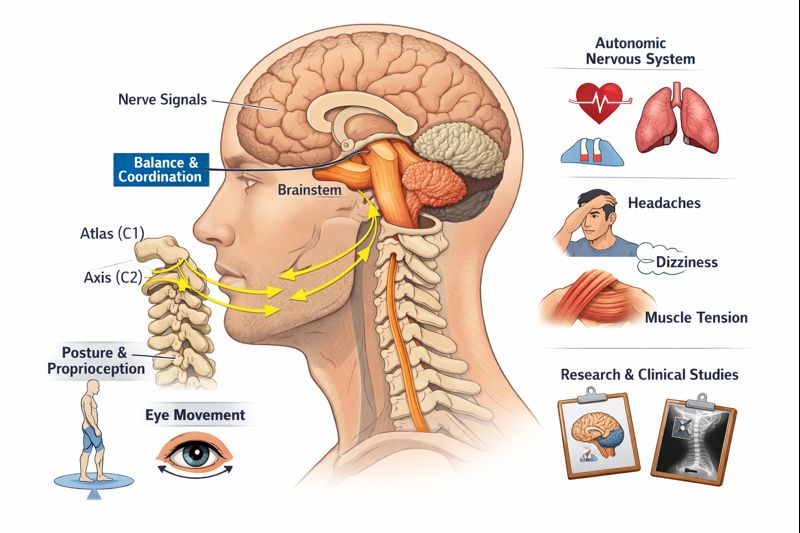
Are you feeling like something is off in your body, but not sure what it could be? You may be suffering from upper cervical subluxation and not even know it. Upper cervical misalignment can cause a wide range of health issues and has serious consequences for your long-term health if left unchecked. In this blog post, we will discuss the effects of upper cervical subluxation and the importance of regular adjustments to keep your spine in proper alignment. By looking at how misalignment can contribute to pain, fatigue, headaches, and more, this article will help shed light on why proper spinal care is essential for optimal health.
What is upper cervical subluxation and how can it negatively impact your health
By downloading the Digital Patient Chart mobile app you can better control your patient portal.
The upper cervical spine is an essential part of the body, as it connects the head to the rest of the spine. When the bones in this region become misaligned, it is known as upper cervical subluxation. This can lead to a range of negative health implications, such as headaches, neck pain, and even issues with the nervous system. The nervous system is responsible for controlling many bodily functions, so when it is compromised due to subluxation, it can have a significant impact on overall health. It's essential to take care of your spinal health to avoid these negative consequences and maintain optimal physical wellness.
How to recognize the signs of upper cervical misalignment
Have you ever experienced neck pain or stiffness that just wouldn't go away? It could be a sign of upper cervical misalignment. This occurs when the vertebrae in your neck are out of alignment, causing problems with your nervous system and overall posture. Some common signs of upper cervical misalignment include headaches, dizziness, and even difficulty swallowing. Paying attention to these signs can help you recognize when it's time to seek treatment. If you are experiencing upper cervical misalignment, it's important to see a chiropractor or other medical professional who can help correct the problem and relieve your symptoms.
The consequences of ignoring upper cervical subluxation
Upper cervical subluxation is a term used to describe the misalignment of the uppermost vertebrae in the spine. Unfortunately, many people choose to ignore this condition, putting themselves at risk for a variety of unpleasant consequences. These can include headaches, neck pain, shoulder pain, and even numbness or tingling in the arms or hands. In some cases, the misalignment can even affect one's balance and coordination, leading to falls and other accidents. If you suspect you may be suffering from an upper cervical subluxation, it's essential to seek treatment right away. Ignoring the problem will only make things worse in the long run.
Benefits of chiropractic care for correcting Upper Cervical Subluxation
Upper Cervical Subluxation is a condition where there is a misalignment of the upper neck vertebrae. It can cause a lot of distress in daily life, such as headaches, neck pain, and general discomfort. Fortunately, chiropractic care can correct this issue and provide many benefits. Correcting Upper Cervical Subluxation can lead to improved nerve function, which can reduce pain and discomfort. It can also improve your immune system, resulting in a stronger overall immune response. Additionally, correcting Upper Cervical Subluxation can improve your body’s overall function, making day-to-day activities much easier. If you suffer from Upper Cervical Subluxation, it's worth considering chiropractic care as a non-invasive and effective treatment option.
How to reduce the chances of developing Upper Cervical Subluxation
Upper Cervical Subluxation is a condition that can cause neck and back pain, headaches, and even affect your nervous system. But there are ways to reduce your chances of developing this condition. One of the best things you can do is practice good posture. Keep your head and shoulders aligned when sitting or standing, and avoid hunching over your phone or computer for extended periods of time. Stretching and strengthening exercises for the neck and upper back can also help prevent Upper Cervical Subluxation. Finally, regular chiropractic care can help identify and correct any misalignments that may lead to this condition. By taking these steps, you can greatly reduce your risk of developing Upper Cervical Subluxation and maintain a healthy, pain-free neck and spine.
Tips for maintaining your spinal health and preventing recurrences
The health of your spine is essential to maintaining a healthy and active lifestyle. Fortunately, there are many ways to prevent spinal injuries and reduce the risk of recurrence. First, make sure to maintain good posture while sitting and standing. This helps to distribute the weight evenly throughout your spine, reducing strain and pressure points. Additionally, exercise regularly to strengthen the muscles supporting your spine, such as your core, back, and hips. Stretching is also important to maintain flexibility and range of motion. By taking these preventative measures, you can maintain the health of your spine for years to come.
To sum it up, upper cervical subluxation is a condition that can have serious consequences on our health and well-being if left untreated. Thankfully, with regular visits to the chiropractor, upper cervical subluxation can be detected early, its effects reversed, and new occurrences prevented. In addition, small steps can be taken daily to ensure your spinal health remains in check. Practicing sensible posture habits like avoiding hunching over when sitting or standing for long periods of time, making sure that mattresses used for sleeping are not too soft or too hard, and limiting intense physical exercise should all help with reducing the chances of developing upper cervical subluxation. If you’ve been having any neck pain recently, don’t hesitate to do an appointment with our experienced chiropractors and see how they can help. Taking care of yourself starts by understanding your body better so make sure to stay informed about upper cervical subluxations!








Leave a comment